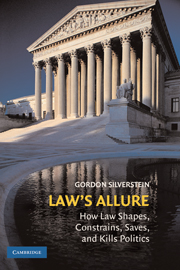Book contents
- Frontmatter
- Contents
- Acknowledgments
- LAW'S ALLURE
- Introduction: Law's Allure: The Juridification of American Politics and Public Policy
- PART I LAW'S ALLURE: WHY, WHY NOW, AND WHY IT MATTERS
- PART II LAW'S ALLURE: PATTERNS, PROCESS, AND CAUTIONARY TALES
- PART III LAW'S ALLURE: COSTS AND CONSEQUENCES
- 9 Tobacco: How Law Saves – and Kills Politics
- Conclusion: The Promise and Peril of Law's Allure
- Bibliography
- Index
- References
9 - Tobacco: How Law Saves – and Kills Politics
Published online by Cambridge University Press: 05 June 2012
- Frontmatter
- Contents
- Acknowledgments
- LAW'S ALLURE
- Introduction: Law's Allure: The Juridification of American Politics and Public Policy
- PART I LAW'S ALLURE: WHY, WHY NOW, AND WHY IT MATTERS
- PART II LAW'S ALLURE: PATTERNS, PROCESS, AND CAUTIONARY TALES
- PART III LAW'S ALLURE: COSTS AND CONSEQUENCES
- 9 Tobacco: How Law Saves – and Kills Politics
- Conclusion: The Promise and Peril of Law's Allure
- Bibliography
- Index
- References
Summary
Efforts to protect privacy and save the environment, reduce poverty, end segregation, assure integration; and demands for fiscal responsibility, an end to political corruption, better and more equitable representation, the reform of the criminal justice system, and the allocation of the war powers – all these and more are problems that are being increasingly structured, framed, shaped, and constrained by judicial rules and automated legal procedures. Legal language dominates our political debates and has for a long time. Law's allure is deeply embedded in a American political system in which an intentionally fragmented government interacts with a political culture deeply suspicious of politics and imbued with a language of rights and rules, liberty and equity.
This is not an argument against the use of law, legal language, or judicial process – these are woven into the fabric of the American political system. Instead, this book is an effort to encourage politicians, policy advocates, and scholars alike to understand when and how these tools can be used most effectively and when their use, when a reliance on law, and legal language, and judicial decisions poses the greatest risks for the goals of those who choose to turn to the law and the courts. The question is not whether law and judicial process is to be employed or not, but rather when and under what conditions.
- Type
- Chapter
- Information
- Law's AllureHow Law Shapes, Constrains, Saves, and Kills Politics, pp. 245 - 265Publisher: Cambridge University PressPrint publication year: 2009



